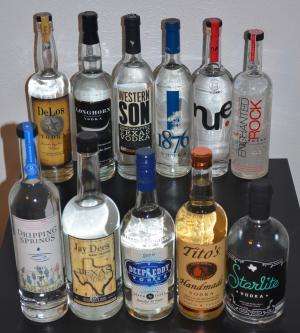Texans are turning to a different kind of spirit—vodka—and saltier is better

Texans, known for enjoying local beers and Dr Pepper soft drinks, now have a growing beverage industry that would appeal to James Bond, who is well-known for enjoying a good martini. Distillers are producing at least 17 Texas vodkas, researchers reported here today, and the most popular are, surprisingly, those that are a bit salty.
Their report, "Shaken not stirred, y'all: A comparison of select Texas vodkas," covered the results of group tastings on the vodkas, as well as some surprising facts about the state's alcoholic beverage market. It was part of the 247th National Meeting & Exposition of the American Chemical Society (ACS).
The meeting, attended by thousands of scientists, features more than 10,000 reports on new advances in science and other topics. It is being held at the Dallas Convention Center and area hotels through Thursday.
"The Texas vodka industry is just exploding," said Diana Mason, Ph.D., the lead researcher of the work. "Two years ago when we started the study, there were only six vodkas in Texas. Now there are 17 and counting. And Texans are supposed to be beer drinkers!"
The expansion of the Lone Star State's distilleries is not limited to vodka, either.
"Right now, there are more than 25 distilleries in the state of Texas, which actually produce a lot of vibrant and diverse alcoholic spirits, including vodka," said Timothy W. Stephens, a graduate student at the University of North Texas, Denton, where he and Mason conducted the study. "The list is expanding to include the production of rum, gin, whiskey, bourbon, flavored liqueurs and even agave spirits similar to tequila." And more than 273 wineries have cropped up in the Lone Star State, according to Stephens.
In their vodka-tasting study, 50 men and women each sampled multiple, small shots of the state's vodkas—presented in test tubes, of course. Mason said participants only consumed, at most, an ounce of vodka because researchers used the "swish and spit" technique popular in wine tastings. The results were surprising, she said. The two most popular brands among the tasters were the ones with the most dissolved salts, which are detected by the tongue as are other tastes such as sweet and sour.
So it was the dissolved salts in the vodka that affected the people's taste buds, said Stephens. Besides conductivity (which was a test the researchers used to detect the salts), the team checked the color, acidity, cost and density of the vodkas. It turned out that conductivity was the only factor separating the favorite brands from the rest. Even the source of the vodka –– corn, wheat, rye, barley, potato, berries and cactus –– didn't affect peoples' preferences, he noted.
Stephens said he plans to conduct further taste studies on Texas-made bourbons, whiskeys, gins and rums.
More information: Shaken not stirred, y'all: A comparison of select Texas vodkas:
Abstract
Commercial solutions produced in Texas (Crazy Water, Dr Pepper, Big Red, Lone Star Beer, Shiner Beer, and wines from 104+ wineries) abound, with a growing interest in alcoholic spirits, particularly vodka. This study explores methods to discern from data collected differences in various Texas vodkas by characterizing flavor profiles, conductivity, pH, and metal ion content of each vodka.
Provided by American Chemical Society
















